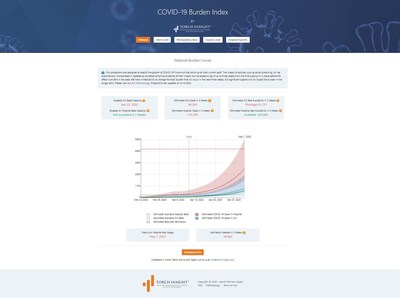Leavitt Partners Insight Launches New Tool to Help Hospitals Rapidly Identify Resources and Capacity-Increasing Interventions to Enhance Their Operational Response to COVID-19

SALT LAKE CITY, April 13, 2020 /PRNewswire/ — Today, Leavitt Partners Insight (LPI), provider of Torch Insight™, launched the COVID-19 Burden Index to aid U.S. health care providers and public health officials in tracking and measuring the burden of the COVID-19 pandemic. The tool estimates, in near-real time, the percent of normal hospital and intensive care unit (ICU) bed capacity currently in use by COVID-19 and non-COVID-19 patients in each county and hospital. The tool provides projections of burden up to 21 days into the future and is updated daily.
This data, combined with other complementary health care data in LPI’s Torch Insight platform, is useful in identifying where resources and capacity-increasing interventions are most needed or may be allocated most effectively. The COVID-19 Burden Index estimates the hospital and ICU bed capacity needed now and up to 21 days into the future. The estimates account for both COVID-19 use of beds and non-COVID-19 use of beds. For hospital bed utilization, the tool adjusts normal utilization for cancellation of elective admissions based on original analysis performed by LPI. Non-COVID-19 ICU cases are unlikely to be affected by cancellations of elective procedures and other similar policies, because the ICU is rarely involved in elective admissions.
Projections for total cases is centered around the current confirmed cases, based on data using confirmed cases of COVID-19 from Johns Hopkins University. The projections calculate regional and hospital-level burden based on expected need from peer-reviewed research and Centers for Disease Control and Prevention (CDC) data on COVID-19 morbidity in the U.S., Census Bureau data on age distributions in counties, and Centers for Medicare & Medicaid Services (CMS) hospital cost report data on beds and utilization and hospital service areas. LPI uses this data to estimate the number of COVID-19 hospital and ICU cases each hospital and county would expect to see given their demographics and current number of active COVID-19 cases. This includes an algorithm that accounts for diversions from full hospitals and ICUs to others in the area not yet at capacity.
Combining these estimated severe COVID-19 cases with expected normal cases, minus elective admissions, gives expected bed and ICU utilization, which can be compared to hospital and ICU capacity. The company also applies this data to its own projections of disease burden, based on a widely used epidemiological forecasting model (see, for example, CHIME by University of Pennsylvania) and county-level estimates of the rate of growth in COVID-19 cases.
As the coronavirus crisis continues, hospitals are straining to meet demand. Of the nearly 3,000 hospitals that have at least one staffed ICU bed, 154 hospitals are currently exceeding their ICU capacity. Sixty-seven hospitals exceed their usual inpatient bed capacity, accounting for cancellations of elective admissions. These facilities are faced with implementing surge capacity measures to accommodate additional patient demand. Hospitals in the New York metropolitan area have been the hardest hit with additional COVID-19 related burden.
According to LPI’s projection model, COVID-19 cases nationwide will peak in early June. During this time period, the company expects 2,052 counties representing almost 271 million Americans will be over-capacity for hospital beds and 2,309 counties (representing 304 million people) will have exceeded normal ICU capacity. Peaks in different counties and states will occur at different times, and projections will update over time as measures to increase social distancing begin to take effect.
“This tool provides a constantly updated projection of where we are headed. It is not a static prediction because we know that administrators and health officials will continue to make improvements in our nation’s capacity to handle patients. We encourage interested parties to use this complimentary resource to enhance their operational response to COVID-19,” says John Fiacco, president and CEO of Torch Insight. “We will update projections as new data about COVID-19 becomes available, so check our dedicated site often for the most current data.”
To access the COVID-19 Burden Index, visit our website: covid19.torchinsight.com.
For information on additional Leavitt Partners’ COVID-19 solutions, visit: leavittpartners.com/covid-19/.
About Leavitt Partners Insight
Leavitt Partners Insight provides Torch Insight, a SaaS health care data and analytics tool developed and incubated at Leavitt Partners. The Torch Insight platform is the culmination of years spent splicing siloed data sets together, during which our team invested thousands of hours cleaning and validating data in preparation for analysis, and integration with business intelligence platforms. We excel at blending population health data with quality, financial, and performance metrics from health care payers, providers, and partners. We use blended data to develop analytical models that reveal trends and relationships enabling our clients to make more intelligent decisions. We also offer our raw data and curated insights to clients. For more information, please visit https://torchinsight.com/.
|
Contact: |
Julie Sommer, vice president of marketing, 720.244.2138 or |
View original content to download multimedia:http://www.prnewswire.com/news-releases/leavitt-partners-insight-launches-new-tool-to-help-hospitals-rapidly-identify-resources-and-capacity-increasing-interventions-to-enhance-their-operational-response-to-covid-19-301038977.html
SOURCE Leavitt Partners
